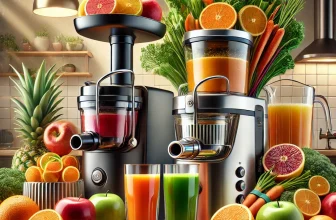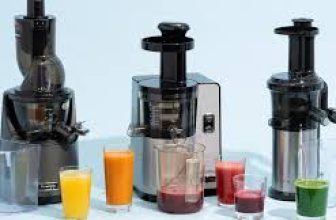As an Amazon Associate I earn from qualifying purchases.
Why Juicer Is Better Than Blender
Why Juicer Is Better Than Blender, Most health enthusiasts are unaware that juicing can extract up to 70% more nutrients from fruits and vegetables compared to blending. Juicers separate the juice from the pulp, preserving vitamins, minerals, and enzymes in a more concentrated form. This ensures that the body absorbs the nutrients more efficiently, making juicing an optimal choice for those seeking maximum health benefits.
No products found.
Historically, juicers have been designed specifically to optimize nutrient retention, while blenders primarily aim at producing versatile smoothies. A compelling statistic to consider is that people who regularly consume freshly juiced beverages report improved digestion and higher energy levels. It’s this focus on nutrient absorption and bodily benefits that positions juicers ahead of blenders in the pursuit of a healthier lifestyle.

Why juicer is better than blender
Juicers extract more nutrients from fruits and vegetables compared to blenders. This is because juicers separate the juice from pulp, which contains essential vitamins and minerals. People who use juicers often notice improved digestion and energy levels. Juicers are designed to maximize nutrient retention, making the juice more beneficial for health. On the other hand, blenders mix everything together, which can dilute the nutrient content.
Another advantage of juicing is the concentration of nutrients in the final drink. When you juice, you need more fruits and vegetables to make one glass of juice. This means you get a higher dose of nutrients in one serving. Blenders, however, create thicker drinks with more fiber, which can be harder to digest. For those looking to absorb nutrients quickly, juicing is the better choice.
Juicers also offer a greater variety of options for health-conscious individuals. With a juicer, you can easily make green juices, detox drinks, and vegetable-based juices. These options are more readily absorbed by the body. Blenders are great for smoothies and milkshakes but don’t offer the same health benefits. A versatile juice diet can cater to various nutritional needs.
The cleanup process is another point where juicers often win. Most juicers come with parts that are easy to disassemble and clean. Many of them are dishwasher-safe, which saves time. Blenders, on the other hand, have multiple components that can be hard to clean thoroughly. For a busy lifestyle, juicers can save a lot of hassle.
Enhanced Nutrient Absorption
Juicers excel at extracting nutrients from fruits and vegetables, leading to better nutrient absorption. By separating the juice from the pulp, more vitamins and minerals are preserved in a concentrated form. This means that the body can absorb these nutrients faster and more efficiently. For example, juiced spinach provides a higher amount of iron compared to blended spinach. This enhanced absorption is crucial for people seeking intense nutritional benefits.
One key aspect of juicing is the preservation of enzymes, which play a significant role in digestion and overall health. When fruits and vegetables are blended, the high-speed blades can generate heat, potentially damaging these sensitive enzymes. In contrast, juicers use a slower extraction process that keeps enzymes intact. This makes the juice more lively and beneficial. Improved enzyme presence can lead to better metabolism and energy levels.
Juicing offers a practical way to consume a wider variety of vegetables that you might not otherwise eat. Combining different fruits and veggies in a juicer allows you to create nutrient-rich drinks. These drinks can include kale, beets, and carrots, which are packed with essential nutrients. Drinking such a mix ensures a comprehensive intake of vitamins and minerals. This varied consumption supports overall health and wellness.
For individuals with specific dietary needs, juicing can be a game-changer. It allows you to cater to unique nutritional requirements easily. For instance, those needing more vitamin C can simply add more citrus fruits to their juice. This flexibility is less achievable with blending, where the final product is thicker and less nutrient-dense. Juicing provides an efficient and effective way to meet targeted health goals.
The Fundamental Difference Between Juicers and Blenders
Juicers and blenders have different purposes and outcomes. Juicers are designed to separate juice from the pulp, leaving you with a smooth, nutrient-rich liquid. This process removes the fibrous material, creating a lighter drink that’s easier to digest. On the other hand, blenders mix everything together, producing a thicker drink that includes all the fiber. This can be beneficial for those looking to increase their fiber intake.
One major difference lies in the consistency of the final product. Juicers produce a clear liquid that is primarily composed of juice. This smooth texture makes it easier for the body to absorb nutrients quickly. Blended drinks are bulkier and can feel more like a meal due to the inclusion of pulp and fiber. This makes smoothies more filling but potentially harder to digest for some people.
The operational mechanisms of each device also vary. Juicers use slow, grinding processes to extract juice, preserving essential vitamins and enzymes. This slow extraction helps retain more nutrients, making juices highly beneficial. In contrast, blenders use high-speed blades to pulverize fruits and vegetables, generating heat that can destroy delicate nutrients. While blending is quicker, it might not offer the same nutritional advantages as juicing.
Both devices have their specific uses depending on lifestyle and dietary goals. A juicer is ideal for those who want concentrated nutrients and easily digestible drinks. Devices come in various models to suit different needs. Blenders excel in creating thicker, fibrous drinks like smoothies or soups. Both have unique advantages, but the choice depends on what one aims to achieve in their diet.
Case Studies: Improved Health with Juicing
Many individuals have reported significant health improvements after incorporating juicing into their daily routines. For example, John, a 45-year-old office worker, experienced notable weight loss and increased energy levels. By drinking a mix of carrot, apple, and ginger juice every morning, he managed to lose 20 pounds in six months. His digestive issues also subsided, making him feel more comfortable and active throughout the day. John’s case is a testament to the positive impact of juicing on overall well-being.
Another compelling case is that of Emma, a 30-year-old teacher dealing with chronic fatigue and low immunity. Emma started juicing leafy greens like spinach and kale, combined with citrus fruits rich in vitamin C. Within three months, she reported fewer sick days and a marked increase in her energy levels. The improvement in her health was evident, and she credited her daily green juice for the change. This case highlights how juicing can strengthen the immune system.
In a different scenario, Michael, a 50-year-old business executive, struggled with high blood pressure and cholesterol. His doctor recommended incorporating fresh beetroot juice into his diet. After consistently drinking the beetroot juice for several weeks, Michael saw significant drops in his blood pressure and cholesterol levels. This natural method not only improved his heart health but also reduced his dependency on medication. Michael’s story showcases the cardiovascular benefits of juicing.
Linda, a college student, faced skin issues such as acne and dull complexion. She started consuming fresh cucumber and carrot juice daily. After just a month, she noticed a drastic improvement in her skin texture and clarity. The antioxidants and vitamins in her juices helped cleanse her skin from the inside out. Linda’s experience demonstrates how juicing can enhance skin health naturally.
For those looking to improve their mental clarity and focus, juicing can also be beneficial. Sarah, a writer, struggled with brain fog and concentration issues. She incorporated a juice blend of blueberries, spinach, and a hint of turmeric into her diet. Within weeks, her cognitive functions improved, and she felt more alert. Sarah’s case underscores the mental benefits juicing can offer.
Exploring the Scientific Arguments for Juicing Over Blending
Scientific research suggests that juicing may offer better nutrient absorption compared to blending. When fruits and vegetables are juiced, the fibers are separated, allowing the digestive system to quickly process the vitamins and minerals. A study published in the American Journal of Clinical Nutrition found that certain nutrients, like beta-carotene, are more efficiently absorbed in liquid form. This heightened absorption can lead to better overall health. Blending, while retaining fibers, may not provide the same nutrient-dense liquid.
Another scientific argument in favor of juicing is its impact on gut health. Fiber is essential for digestion, but too much of it can slow down the nutrient absorption process. Juicing removes most of the insoluble fiber, making it easier for the body to quickly assimilate essential nutrients. This can be particularly beneficial for individuals with sensitive digestive systems. In contrast, blended drinks keep all the fiber, which may sometimes cause bloating or gas.
Oxidation is another factor where juicing outperforms blending. The high-speed blades of a blender can introduce more air into the mix, leading to faster nutrient degradation. This means that the vitamins and antioxidants can break down more rapidly, reducing the health benefits of your drink. Juicers, especially masticating ones, operate at lower speeds and create less oxidation. This helps maintain the nutrient integrity of the juice for a longer time.
Energy levels are another area where juicing has been shown to be beneficial. A study from the Journal of Alternative and Complementary Medicine found that individuals who consumed fresh juice reported higher energy levels than those who drank smoothies. The quick absorption of nutrients provides an immediate boost. This makes juicing an excellent choice for a morning energy kick. Blenders produce thicker drinks that may not be as quickly absorbed.
Several studies have also indicated that juicing can help detoxify the body more effectively than blending. Phytochemicals, natural compounds found in plants, play a key role in detoxification. These compounds are more readily absorbed when extracted through juicing. Research suggests that a juice cleanse can support liver function and remove toxins more efficiently. Blended drinks, while still healthy, don’t offer the same concentrated detox benefits.
The Convenience and Versatility of Juicers
Juicers are incredibly convenient for anyone looking to incorporate more fruits and vegetables into their diet. Most modern juicers are easy to use with simple settings. They are quick, often taking just a few minutes to produce a fresh glass of juice. Cleanup is also usually straightforward, with many parts being dishwasher-safe. This convenience makes it easy for busy individuals to maintain a healthy lifestyle.
The versatility of juicers extends beyond making simple fruit juices. You can create a wide range of drinks, from green vegetable juices to exotic fruit mixes. Juicers allow you to experiment with different flavors and combinations. For example, you can mix kale, celery, and apple for a nutrient-packed green juice. This variety helps keep your daily juice regimen exciting and flavorful.
Juicers can also be used for other culinary purposes. Many models come with attachments that allow you to make nut milks, sorbets, and even baby food. This multi-functionality makes a juicer a valuable addition to any kitchen. It opens up possibilities for experimenting with various healthy recipes. The versatility of juicers ensures that they can be used for much more than just juicing.
Another advantage is the ability to customize your juice according to health needs. For instance, if you need an immune boost, you can easily add ingredients like ginger and lemon. If you’re looking to improve skin health, adding cucumber and carrot can be beneficial. This level of customization is harder to achieve with a blender. Juicers provide the flexibility to tailor your drinks to meet specific health goals.
Lastly, juicers are ideal for those looking to detoxify their bodies. The concentrated nutrients in juice can help flush out toxins more effectively. There are many detox juice recipes available that are designed to cleanse different organs. This makes juicers a valuable tool for those interested in detoxification. The convenience and versatility of juicers truly make them a superior choice.
Frequently Asked Questions
Understanding the differences between juicers and blenders can help you make better nutritional decisions. Below are some common questions and answers that shed light on the benefits of each device.
1. What are the health benefits of using a juicer?
Juicing allows for quicker nutrient absorption because it removes most of the insoluble fiber, making it easier for the body to process vitamins and minerals. This can improve digestion, energy levels, and overall health. The concentrated nutrients in juice can also provide an immediate boost, especially when combined with a variety of fruits and vegetables.
Additionally, juicing helps preserve sensitive enzymes that aid in digestion and metabolism. The slow extraction process used by many juicers minimizes oxidation, retaining more nutrients than blending. This preservation leads to a more nutrient-dense drink that offers numerous health advantages.
2. Can a juicer be used to prepare other types of food?
Yes, many modern juicers come with attachments that allow them to prepare various foods beyond just juice. For example, you can use a juicer to make nut milks like almond or cashew milk. Some models even offer features for creating sorbets and baby food.
This multi-functionality makes a juicer a valuable kitchen appliance capable of meeting diverse culinary needs. By experimenting with different settings and ingredients, users can discover new ways to incorporate healthy foods into their diet without relying solely on juice.
3. How does juicing affect digestion compared to blending?
Juicing improves digestion by removing insoluble fiber from fruits and vegetables, resulting in a smoother liquid that’s easier for the stomach to handle quickly absorbing essential nutrients without taxing your digestive system is key benefit.
On the other hand unlike blending includes all fiber in mix ages which could sometimes lead bloating or gas while fiber plays vital role digestion may be harder absorbs Nutrient effectively hence Juicing advantageous those sensitive digestive systems seeking lighter drinks richer nutrient content.
Conclusion
Incorporating juicing into your daily routine offers numerous benefits, from enhanced nutrient absorption to improved digestion and energy levels. The ability to create nutrient-dense drinks tailored to your health needs makes juicers a versatile and valuable kitchen appliance. This focus on health and wellness can lead to a more balanced and vibrant lifestyle.
While both juicers and blenders have their unique advantages, the choice ultimately depends on your nutritional goals and lifestyle. Juicers may require initial investment and regular maintenance, but their benefits in promoting good health are well worth it. Embracing juicing can pave the way for a healthier, more energetic you.

Maksuda Khanam is a passionate home appliance expert and the primary author behind KitchenMarts.com






